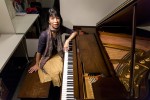UCLA music lecturer Gloria Cheng realized she was in the midst of a legendary gathering of musicians. John Williams, Don Davis, Michael Giacchino, Randy Newman and Bruce Broughton huddled around a piano with a slew of sheet music – compositions they had written not for film, but for Cheng herself to perform.
Over the course of a two-day recording session, the composers and Cheng worked at the Colburn School in downtown Los Angeles to capture more than 70 minutes worth of music. The musicians’ original pieces – along with one by Alexandre Desplat, who could not be at the live session – were to be recorded into a collaborative CD known as “Montage,” a compilation of solo piano works by each of the famed film score composers.
Cheng, as a Grammy-winning concert pianist and the mind behind “Montage,” was to interpret the pieces for the album, which is set for release Tuesday.
Cheng said the idea to get film score composers to write piano pieces came to her after Broughton, a UCLA lecturer of composition whose music has underscored the movies “Silverado” and “Young Sherlock Holmes,” wrote her “Five Pieces for Piano” as a gift.
“(Cheng) looked a little stunned, I don’t know how many people just present her with music,” Broughton said.
From there, Cheng worked with her longtime colleague John Williams – who scored the “Indiana Jones” and “Star Wars” movie series and “Jaws” – to create a jazz-inspired, three-movement piano piece called “Conversations,” which she premiered at a recital at Tanglewood’s Festival of Contemporary Music in 2012 along with Broughton’s work.
But these two pieces in Cheng’s Tanglewood recital were just the first of several more solo piano compositions that would become “Montage.”
“With two birds in hand, with Bruce Broughton and John Williams, I thought, ‘Let’s make a theme out of this,’” Cheng said.
Inspired by the idea of having Hollywood film score composers write beyond the silver screen, Cheng reached out to Don Davis (“The Matrix”), Michael Giacchino (“Ratatouille”), Randy Newman (“Toy Story”) and Alexandre Desplat (“Philomena”) asking them to contribute their own freestanding pieces. The composers, Cheng said, were fascinated with the idea.
“I know that they found the idea scary, because writing for piano is scary and it’s a very exposed, intimate instrument to write for,” Cheng said. “You can’t hide behind the cymbal crash or you can’t just throw in a nice harp (glissando), you have to actually write really good notes. So I think they were intrigued by the challenge.”
Broughton said writing for solo piano is a task that differs quite markedly from scoring a film. He said that film music always depends on the scene it is accompanying, whether happy or sad, or long or short.
“But in terms of coming up with (piano music), it’s not an accompaniment,” Broughton said, “It’s the whole thing, there’s no box office attached to it.”
Cheng said when she found out five of the six of her composers for “Montage” were able to make it to the recording session to oversee her playing, she knew she had to chronicle the experience. To do this, Cheng said she decided to expand “Montage” into not only a CD, but a documentary. Cheng started a Kickstarter to fund the documentary’s filming, raising $5,000 more than her initial $16,000 goal over a 30-day period.
In the documentary, Cheng gave each of the composers an opportunity to speak to their experiences writing for piano, which she said she hoped would allow their audiences to see a side of them beyond their film music.
https://www.youtube.com/watch?v=52WrNa51E-0
“(These musicians) have literally millions of fans around the world for their film music, but I was interested in them as free composers,” Cheng said. “I think they got to stretch and be themselves in a way that they couldn’t, that they can’t, with the constraints of the film.”
Having seen Cheng perform contemporary piano music in the past, Giacchino, the Academy Award-winning film composer for “Up,” said he was grateful for the opportunity to be pushed to write something outside of his canon of film scores.
“It was fun to just jump in and spend a few days writing something that was just for me,” Giacchino said.
Giacchino, whose six-minute “Composition 430” is included in the “Montage” album, said each of the pieces in “Montage” reflects the personalities of the composers who created them.
“Don Davis has a very sort of thought-out, almost numerical process to his writing, whereas Randy has a good sense of humor, and all of that was in his writing,” Giacchino said. “John has a sense of soul and romanticism but also is able to explore the technique as well, so his piece has a nice mix of that.”
Cheng said that most of the composers’ piano pieces in “Montage” are stylistically dissimilar compared to their film work, and that some listeners may be confused by this difference when first hearing the CD.
“I think that their fans, if they’re true music lovers, they’ll be intrigued by this,” Cheng said. “I think some may be disappointed because there aren’t the soaring themes, there is not a love theme in here. It’s what they wrote without having to do any of that stuff.”
Broughton said it is Cheng’s bold piano playing that ties together the “Montage” recording.
“(Cheng) plays music that most people would shrink from,” Broughton said. “There aren’t two pieces on this album that have the same style at all, and she carries them all off in a solidly convincing way … I call her fearless.”
Cheng said she was very pleased with the diversity of “Montage,” both in terms of the music and the personalities involved in creating the album.
“This was just, ‘write whatever is in your heart,’” Cheng said. “I treasure this project because I feel like it shows these composers from a vantage point that very few people have exposed before.”
